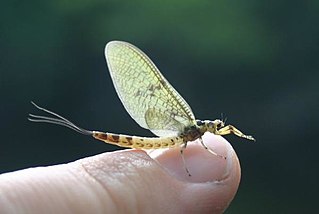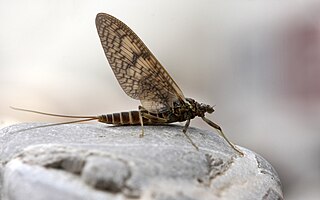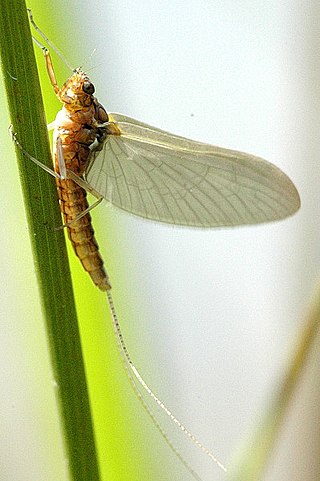
Mayflies are aquatic insects belonging to the order Ephemeroptera. This order is part of an ancient group of insects termed the Palaeoptera, which also contains dragonflies and damselflies. Over 3,000 species of mayfly are known worldwide, grouped into over 400 genera in 42 families.

Sturgeon Bay is an arm of Green Bay extending southeastward approximately 10 miles into the Door Peninsula at the city of Sturgeon Bay, located approximately halfway up the Door Peninsula. The bay is connected to Lake Michigan by the Sturgeon Bay Ship Canal. The Potawatomi name for Sturgeon Bay is "Na-ma-we-qui-tong".

The Hare's Ear or Gold Ribbed Hare’s Ear is a traditional artificial fly imitating an aquatic insect larva (nymph) used in fly fishing.

Tony Curran is a Scottish actor who has appeared in Underworld: Evolution, Doctor Who, Roots, and the Netflix historical epic Outlaw King. He appears in the Marvel Cinematic Universe film Thor: The Dark World (2013) as Bor and the second season of Daredevil (2016) as Finn Cooley. In late 2022, Curran starred in the BBC drama Mayflies.

The name Palaeoptera has been traditionally applied to those ancestral groups of winged insects that lacked the ability to fold the wings back over the abdomen as characterizes the Neoptera. The Diaphanopterodea, which are palaeopteran insects, had independently and uniquely evolved a different wing-folding mechanism. Both mayflies and dragonflies lack any of the smell centers in their brain found in Neoptera.

Baetidae is a family of mayflies with about 1000 described species in 110 genera distributed worldwide. These are among the smallest of mayflies, adults rarely exceeding 10 mm in length excluding the two long slender tails and sometimes much smaller, and members of the family are often referred to as small mayflies or small minnow mayflies. Most species have long oval forewings with very few cross veins but the hindwings are usually very small or even absent. The males often have very large eyes, shaped like turrets above the head.

The Heptageniidae are a family of mayflies with over 500 described species mainly distributed in the Holarctic, Oriental, and Afrotropical regions, and also present in the Central American Tropics and extreme northern South America.

"Reset" is the sixth episode of the second series of the British science fiction television series Torchwood, which was first broadcast on BBC Three on 13 February 2008.

Leptophlebiidae is a family belonging to the Ephemeropterans that are commonly known as the prong-gilled mayflies or leptophlebiids. It is the only family in the superfamily Leptophlebioidea. There are more than 650 described species of Leptophlebiids, which are easily recognized by the forked gills present on the larvae's abdomen, thus their common name.

His Majesty's Airship No. 1 was designed and built by Vickers, Sons and Maxim at their works in Barrow-in-Furness, Lancashire, England, as an aerial scout airship for the Royal Navy. It was the first British rigid airship to be built, and was constructed in a direct attempt to compete with the German airship programme. Often referred to as "Mayfly", a nickname given to it by the lower deck, in public records it is designated 'HMA Hermione' because the naval contingent at Barrow were attached to HMS Hermione, a cruiser moored locally preparing to act as its tender.

Centroptilum is a genus of mayflies of the family Baetidae.

Eriogonum luteolum is a species of wild buckwheat known by the common name goldencarpet buckwheat. It is native to many of the mountain ranges of California and southern Oregon, including the Sierra Nevada, Cascades and California Coast Ranges. It grows in mountain and foothill habitat, such as forest and woodland, on granite and sometimes serpentine soils.

Dendrobium luteolum is a species of epiphytic orchid in the subtribe Dendrobiinae.
Auriscalpium luteolum is a species of fungus in the family Auriscalpiaceae of the Russulales order. First described as Hydnum luteolum by Elias Magnus Fries in 1874, it was transferred to the genus Auriscalpium by Petter Karsten in 1879.

Coxoplectoptera or "chimera wings" is an extinct order of stem-group mayflies containing one family, Mickoleitiidae. Together with mayflies (Ephemeroptera), Coxoplectoptera are assigned to the clade Heptabranchia.

The Holy Family with the Dragonfly, also known as The Holy Family with the Mayfly, The Holy Family with the Locust, and The Holy Family with the Butterfly is an engraving by the German artist Albrecht Dürer (1471–1528) from approximately 1495. It is quite small but full of intricate detail. A very popular image, copied by other printmakers within five years of creation, it is found in most major print room collections, including the Indianapolis Museum of Art and the UK Royal Collection.

Pannota is a suborder of mayflies. One of the differences between this suborder and its sister group Schistonota concerns the degree of fusion of the wing pads in the final-stage nymph; in Schistonota, the degree of fusion along the mesothorax is more than half the fore-wing length while in Pannota the degree of fusion is less than half that length. Other differences between the two groups include the morphology of the gills and also behavioural differences. Schistonota nymphs are mostly active swimmers, burrowers and sprawlers, while Pannota nymphs are more passive, slow-moving crawlers.

Ephemera simulans is a species of mayfly. It is commonly found throughout the United States. The species is used for fly fishing.

Pisciforma is a suborder of mayflies in the order Ephemeroptera. There are at least 410 described species in Pisciforma.

Furcatergalia is a suborder of mayflies in the order Ephemeroptera. There are about 14 families and at least 1,700 described species in Furcatergalia.


















